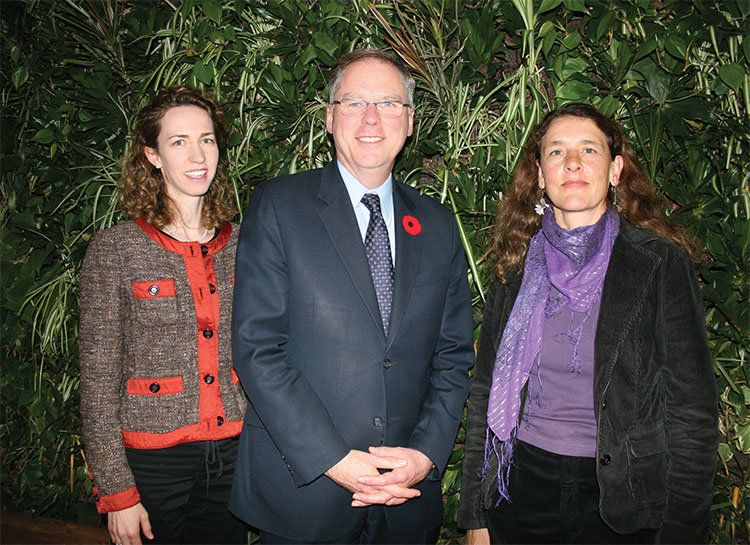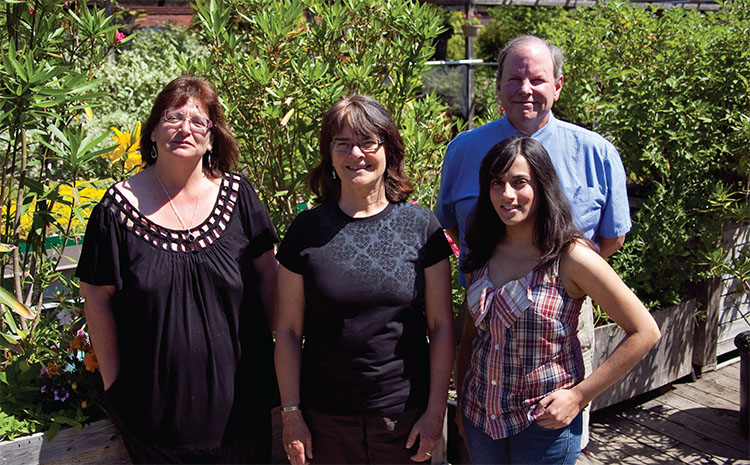CAPE
The Green Coat Revolution
You might visit your doctor for an annual checkup or to make sure that nagging pain or new mole isn’t a sign of a more serious illness. You may even see your doctor to find out about improving your diet or maintaining an active lifestyle. But you probably don’t think to turn to your doctor for advice about environmental activism – unless, of course, they are a member of the Canadian Association of Physicians for the Environment (CAPE).
Established in 1994, CAPE represents doctors, allied healthcare practitioners, and concerned citizens from across Canada who understand the link between our health and our surroundings. CAPE brings doctors and other health experts to meet with political decision-makers to discuss the need for environmentally protective legislation because a healthy environment means healthy people. Current issues on the CAPE agenda include: banning lawn pesticides, closing coal power plants, promoting local organic food, making hospitals more environmentally friendly, and ending asbestos mining and export. In recent years, the organization has seen remarkable growth – from just 450 members in 2006 to over 5,000 today. Membership growth for CAPE translates into more support and success in achieving health-protective laws.

Dr. Warren Bell, one of the organizations founders, explains, “patient care is about more than just treating a disease or a symptom. It includes illness prevention by way of protecting our air, water and land.” A family physician in Salmon Arm BC, Dr. Bell is actively involved in CAPE’s anti-pesticide campaign as well as fighting large-scale development in his home town. “If we don’t target the cause of our illnesses, we are contributing to an unsustainably expensive health care system. Protecting our environment is the first step to improving our overall health as well as saving a lot of money for other things.”

Partnering with organization’s such as the Canadian Cancer Society and the David Suzuki Foundation, CAPE led the fight in achieving Ontario’s pesticide ban, which came into effect in April 2009. “Ontario’s ban on lawn and garden pesticides is the most healthprotective legislation of its kind in North America,” says CAPE’s Executive Director, Gideon Forman. “We’re now using Ontario’s law as a model for our efforts in other provinces. If Ontario kids can be protected from these poisons, kids elsewhere in the country can be as well.” According to the Ontario College of Family Physicians’ Pesticides Literature Review, lawn and garden pesticides are linked to childhood cancers, neurological illness and birth defects.
The flip-side to CAPE’s pesticide campaign focuses on the positives of a chemical-free lifestyle – it’s an educational program called Organics for Kids. Launched in 2006, the program takes city kids on a day-trip to an organic farm to learn about the benefits of ecological agriculture and eating organic – and CAPE picks up the cheque! Depending on the season, children have the chance to harvest carrots, taste fresh greens, visit greenhouses, prepare food boxes, and even play with organically raised free-run chickens. Most importantly, they get to meet the farmers responsible for growing the food we see on our plates every day. By making this connection, CAPE hopes children will make healthier eating choices and support local organic farming.
With climate change at the forefront of most enviro-conscious minds, CAPE makes the health-case to curb the warming of our planet and the focus is on coal. Experts around the world, including Nobel-prize-winning economist Paul Krugman and leading climate scientist James Hansen are naming coal as the foremost climate destroyer. If we do nothing else, these experts say, we must tackle this fossil fuel.
Coal is both a climate culprit and a health hazard and CAPE has taken a strong stance against using it for energy. In spring 2011, they partnered with large health groups including the Registered Nurses’ Association of Ontario and the Asthma Society of Canada, in a unique campaign asking the Ontario government to phase-out coal plants and invest in conservation, wind and solar power. The initiative included ads which appeared in newspapers across Ontario and urged citizens to ask their local candidates where they stand on coal and renewables.
The anti-coal campaign also involved bringing health experts to meet with members of provincial parliament to speak about the importance of a coal phase-out, which would save lives and millions of dollars a year in health costs. Dr. Hilary de Veber is CAPE’s vice president and a paediatrician in Toronto. “Coal-fired electricity emits pollutants which increase the risk of heart disease, asthma attacks and other common health problems,” Dr. de Veber explains. “Ontario’s coal emissions account for over 150,000 illnesses and 300 deaths a year. We would benefit from improved health, environmental protection and overall cost savings if we phased out coal.”

Another Canadian environmental-health hazard lurks in what should be an obsolete industry, but is instead a blight on our nation’s reputation. CAPE is active in Quebec, urging the government to put an end to the mining and export of chrysotile asbestos. Despite its world-wide recognition as a cause of asbestosis, mesothelioma, and lung cancer, the government still allows this deadly powder to be mined and sold abroad, while it is simultaneously being removed from government buildings. And with no North-American markets for asbestos, the product is sold to countries in Asia, Africa and Latin America, where health and safety laws are lax or non-existent. CAPE’s anti-asbestos campaign kicked-off with a full page ad in Le Devoir in February 2011 and they are continuing to keep the pressure on the Quebec government to end subsidies to the industry and provide a just transition for workers in the field.
CAPE also does some work to make healthcare facilities more environmentally friendly, primarily through changing transport, energy and purchasing policies. Dr. Jean Zigby is CAPE’s president, a Montreal-based family physician and palliative care specialist. He is also founding president of Synergie Santé Environnement, a non-profit organization whose mission is to reduce the eco-impact of health care delivery. “Hospitals are some of the worst environmental offenders in the country. They are energy intensive and produce a lot of waste from a wide range of sources,” says Dr. Zigby. “With a small amount of effort, facilities can integrate better products and methods, which results in a safer clinic for staff and for patients, and a smaller ecological footprint.”
With their twentieth anniversary only three years away, CAPE has accomplished many feats and as the organization continues to grow, they hope to do even more. Our reality now includes lackadaisical companies causing record-breaking oil spills and environmental pollutants contributing to sky-rocketing cancer-rates. The environment certainly can’t protect itself from this bombardment of pollution – it’s up against too much. We’re lucky to have a group of dedicated docs looking out for us and humbly putting the planet at the top of their to-save list.
Membership in CAPE is open to anyone and is not exclusive to doctors. To learn more, or to become a member of the Canadian Association of Physicians for the Environment, please visit www.cape.ca, facebook.com/ capedoctors, twitter.com/cape_doctors.








